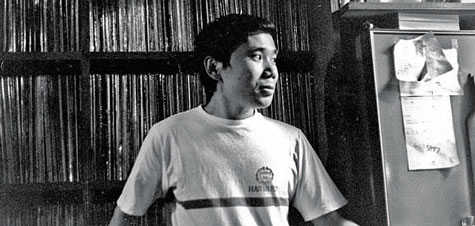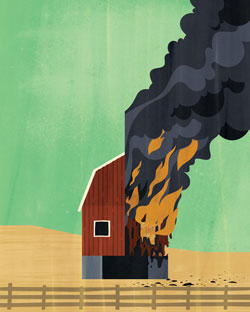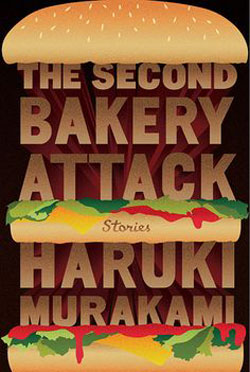
International novelist Haruki Murakami’s first novel, Hear the Wind Sing(1979) was an immediate success, and since then, he has developed a fanatic worldwide following that eagerly anticipates each new release. Other critical and commercial bestsellers include Hard-Boiled Wonderland and the End of the World (1985), The Wind-Up Bird Chronicle (1994-1995), Kafka on the Shore (2002), and 1Q84 (2009–2010).
Murakami’s fiction effortlessly mixes dashes of Raymond Chandler, Franz Kafka, and even jazz into a blender with the author’s own distinct voice. In a 2004 interview for The Paris Review, Murakami succinctly explained his allegorical approach to storytelling: “I don't like the realistic style, myself. I prefer a more surrealistic style.”
Sprinkled throughout those milestones mentioned are numerous short stories, like the following three, that help form the foundation of his incredible body of work.
 “Barn Burning”
“Barn Burning”
(English publication: The New Yorker, 1983)
A novelist meets a free-spirited young woman who seems to live from man to man. For a time, she’s with the writer, and then she decides—after inheriting a little money from her recently deceased father—to travel to North Africa. When she returns, she’s with another lover—one who doesn’t seem to have any real job, though it’s explained he’s in “trading.” One night, all three gather to party, smoke grass, and listen to jazz records. After the woman falls asleep, her now loose-lipped boyfriend reveals he has a passion for arson and torching ramshackle barns.
“Pretty simple, really. I pour gasoline and throw a lighted match. Flick, and that’s it. Doesn’t take fifteen minutes for the whole thing to burn to the ground.“
The writer is fascinated by this confession and keeps asking for more details about this unusual criminal pastime. He learns the arsonist has targeted a barn close by, but he doesn’t get any more precise. In the days to come, the writer thinks he has it narrowed down to five possible barns, though nothing ever happens.
Then, by chance, he meets the arsonist in public and the man reveals he did indeed burn the barn like he had planned. But, by then, the writer has learned of something far more unsettling.
The final sentence: “Although just now and then, in the depths of the night, I’ll think about barns burning to the ground” haunts long after you finish his next story.
 “The Second Bakery Attack”
“The Second Bakery Attack”
(English publication: Playboy, 1985)
It’s late at night, and a husband and wife have “tremendous, overpowering hunger pangs.” They begin finishing off the only items in the kitchen: a few cans of beer and four soggy butter cookies. Their dilemma reminds the husband of the time he and a friend decided to rob a bakery, but instead were confronted by the owner who bargained that if they listened to an entire Wagner LP with him, they could take as much bread as they could carry.
They agreed and were stocked for many days, but the husband explains that it would have been better if they had “threatened him with our knives and taken the damn bread.” He’s vague as to why they made the wrong choice, but before long, his wife surprises him with the idea that he could right the past by holding up another bakery.
They scour Tokyo, not finding one opened at such an early hour, and settle for the next best thing.
“We’re going to take that McDonald’s,” she said, as coolly as if she were announcing what we would have for dinner.
“McDonald’s is not a bakery,” I pointed out to her.
“It’s like a bakery,” she said. “Sometimes you have to compromise. Let’s go.”
There’s a noir that looms in Murakami’s fiction that may trace back to a childhood experience he told The New York Times in 2011. At three years of age, he fell into a creek and was rescued by his mom just before he was swept into a tunnel. “The coldness of the water and the darkness of the tunnel—the shape of that darkness. It’s scary. I think that’s why I’m attracted to darkness.”
 ”The Elephant Vanishes”
”The Elephant Vanishes”
(English publication: The New Yorker, 1985)
A private zoo has to close its operations, and homes are found for all the animals except one lone, old elephant. The town decides to keep the elephant and houses it along with the animal’s keeper who had taken care of it for many years.
The elephant house and grounds were surrounded by a massive fence nearly ten feet high. The question of security had been hotly debated in the town council, and the town had settled upon a system that might be considered somewhat excessive for keeping one old elephant. Heavy iron bars had been anchored in a thick concrete foundation (the cost of the fence was borne by the real-estate company), and there was only a single entrance, which was found locked from the inside. There was no way the elephant could have escaped from this fortress-like enclosure.
But the elephant does, along with its keeper, vanish into thin air. The last person to see them is reluctant to come forward, though he has witnessed something quite fantastical happening between the animal and keeper the night before the disappearance. And, partly because of that abstract occurrence, he’s afraid of becoming the police’s number one suspect.
Haruki Murakami is very much the magician, in that we, the audience, are often caught unaware by his sleight of hand and grace as he surreptitiously traverses realms; from the mundane to the unexplained and back again.
Where does this fertile imagination sprout?
He is quoted as saying, “Writing a story is like playing out your dreams while you are awake.”
If that’s the case—and it’s awful selfish to say—let’s hope he gets very little sleep in the years to come.
David Cranmer aka Edward A. Grainger is the publisher and editor of BEAT to a PULP books http://www.beattoapulp.com/ and writer of the forthcoming The Drifter Detective #7: Torn and Frayed. He lives in New York with his wife and daughter.

His writing sounds a bit like James Joyce in Ulysses re the dream part. Interesting.
I read about Murakami some while back in The Atlantic. A serious look at his work, emphasizing his phenomenal popularity. I have yet to dip a toe into the surrealistic river of his imagination, however. You’ve just nudged me closer to the bank.
David, I have Murakami’s KAKFA ON THE SHORE which remains unread. These three stories sound interesting, and certainly unusual, and I agree with their description in your headline.